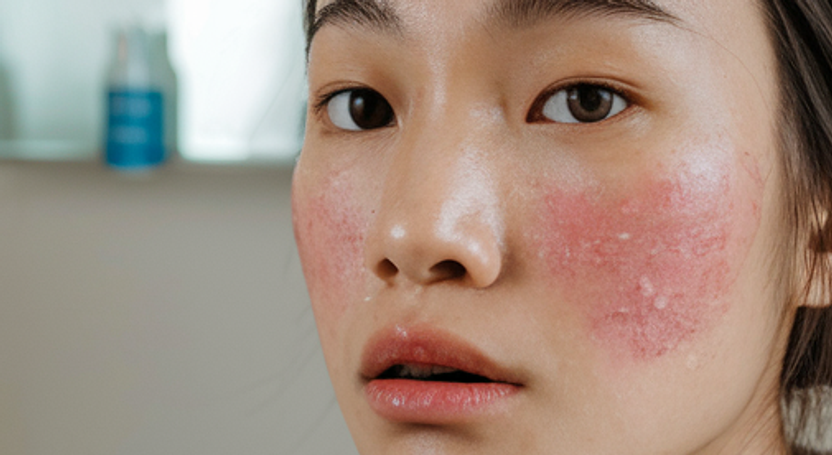Understanding Sensitive Skin: Causes, Symptoms, and How to Care for It
By:
Kevin Chong
On
31/10/2024Reading time:
5 min
Summary:
Sensitive skin is a common condition that affects millions of people worldwide. Those with sensitive skin may experience discomfort, irritation, and flare-ups in response to a variety of environmental factors and skincare products. While sensitive skin can be challenging to manage, understanding its causes and symptoms can help you find the right solutions to keep your skin calm and healthy.
In this blog, we’ll explore what sensitive skin is, its potential causes, and how to care for it with the right skincare routine and habits.

What Is Sensitive Skin?
Sensitive skin is not a medical diagnosis but rather a term used to describe skin that is more reactive than normal. People with sensitive skin may experience discomfort or adverse reactions to products or environmental factors that wouldn’t affect those with more resilient skin. These reactions can include redness, burning, stinging, itching, and dryness.
Sensitive skin can occur on any part of the body but is most commonly experienced on the face. The condition can range from mild irritation to severe reactions, depending on individual triggers and the severity of the sensitivity.
Common Causes of Sensitive Skin
Sensitive skin can be caused by a variety of factors, including:
1. Environmental Factors
Exposure to harsh weather conditions—such as cold wind, heat, or low humidity—can strip the skin of its natural moisture, leading to irritation and increased sensitivity. Air pollution and UV rays can also exacerbate skin sensitivity by weakening the skin’s natural protective barrier.
2. Harsh Skincare Products
Certain ingredients commonly found in skincare products can trigger reactions in people with sensitive skin. Fragrances, alcohol, sulfates, and essential oils are some of the most frequent culprits. Over-exfoliating or using products with strong acids (like AHAs or retinoids) can also lead to irritation and worsen sensitivity.
3. Underlying Skin Conditions
Sensitive skin is often linked to underlying skin conditions such as eczema, rosacea, or dermatitis. These conditions make the skin more reactive to environmental stressors and skincare products, leading to flare-ups and discomfort.
4. Genetics
For some people, sensitive skin is inherited. If you have a family history of allergies, asthma, or skin conditions like eczema, you may be more prone to developing sensitive skin yourself.
5. A Weak Skin Barrier
Sensitive skin is often associated with a compromised or weakened skin barrier. The skin barrier is the outermost layer of the skin that helps retain moisture and protect against environmental aggressors. When this barrier is damaged, it allows irritants to penetrate more easily, leading to increased sensitivity and inflammation.
Symptoms of Sensitive Skin
The symptoms of sensitive skin can vary but commonly include:
Redness: The skin may become red or blotchy, particularly after exposure to irritants or environmental stressors.
Burning or Stinging Sensation: Sensitive skin often feels warm or experiences a burning or stinging sensation, especially after applying certain skincare products.
Itching: Persistent itching can be a sign of sensitive skin, especially when triggered by weather changes, hot showers, or harsh products.
Dryness and Flaking: Sensitive skin is more prone to dryness, which can lead to flaking and cracking.
Rashes or Bumps: In severe cases, sensitive skin may develop rashes, small red bumps, or hives in response to irritants.
How to Care for Sensitive Skin
Managing sensitive skin requires a gentle, consistent skincare routine focused on soothing and protecting the skin. Here are some tips for caring for sensitive skin:
1. Choose Gentle, Fragrance-Free Products
One of the most important steps in caring for sensitive skin is using fragrance-free and hypoallergenic products. Fragrances are a common irritant and can trigger redness, itching, or allergic reactions. Look for products labeled “for sensitive skin” or “dermatologist-tested”, as these are less likely to contain harsh ingredients.
2. Moisturize Regularly
Keeping sensitive skin well-moisturized is essential for maintaining the skin’s protective barrier. Choose a fragrance-free moisturizer with ingredients like ceramides, glycerin, or hyaluronic acid, which help hydrate and soothe the skin without causing irritation.
3. Use Mild Cleansers
Avoid using harsh soaps or cleansers that strip the skin of its natural oils. Instead, opt for gentle, soap-free cleansers that are formulated for sensitive skin. Look for cleansers that are pH-balanced and free from sulfates, which can be drying and irritating.
4. Avoid Over-Exfoliating
While exfoliation is important for removing dead skin cells, over-exfoliating can cause irritation and worsen sensitive skin. Stick to gentle exfoliants (like lactic acid or mandelic acid) and limit exfoliation to once or twice a week. Avoid physical scrubs that contain harsh particles, as they can damage the skin’s surface.
5. Patch-Test New Products
Always patch-test new skincare products before applying them to your face. Apply a small amount of the product to an inconspicuous area, like behind your ear or on your wrist, and wait 24-48 hours to see if any irritation occurs. This can help you avoid a full-face reaction to a product that doesn’t suit your skin.
6. Protect Your Skin from the Sun
Sensitive skin is often more prone to sunburn and UV damage, so it’s important to wear a broad-spectrum sunscreen with at least SPF 30 every day. Choose a mineral-based sunscreen (like zinc oxide or titanium dioxide), as these are less likely to cause irritation compared to chemical sunscreens.
7. Avoid Hot Water
Hot water can strip the skin of its natural oils and worsen dryness and sensitivity. Opt for lukewarm water when washing your face or taking a shower, and always moisturize immediately afterward to lock in moisture.
Caring for sensitive skin requires patience and a gentle, thoughtful approach. By using soothing, fragrance-free products, avoiding common irritants, and keeping your skin moisturized and protected, you can minimize discomfort and keep your skin healthy. If you’re unsure about which products to use or continue to experience irritation, consulting with a dermatologist can help you develop a personalized skincare routine that works for your sensitive skin.
